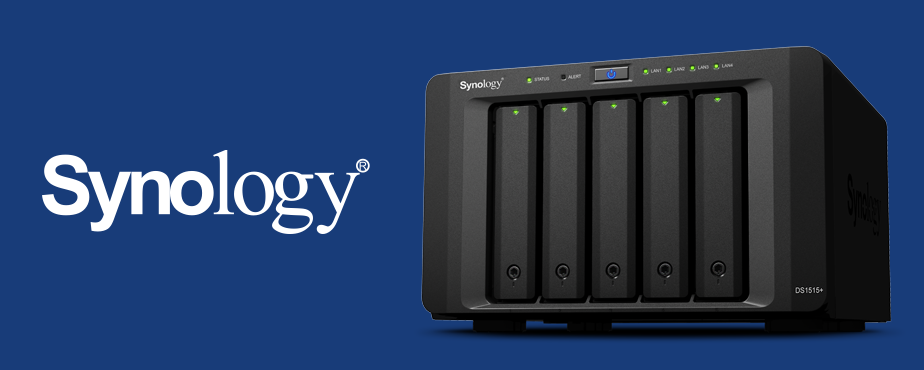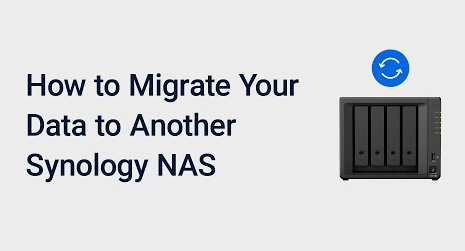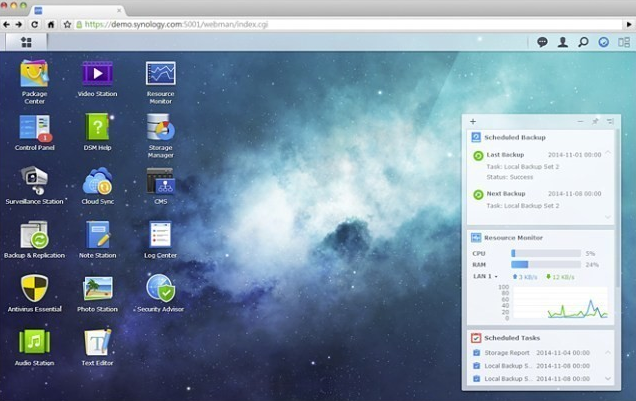Synology technology refers to solutions and products developed by Synology Inc., primarily known for their Network Attached Storage (NAS) devices. These devices allow users to store, share, and backup their data efficiently across multiple platforms and locations.
Synology DiskStation Manager (DSM)
The Synology DiskStation Manager (DSM) is the operating system powering Synology NAS devices. DSM offers an intuitive user interface, making the complex task of managing digital storage straightforward.
Overview of DSM
Synology's DSM has made significant strides since its inception. It's not just an operating system; it's a comprehensive tool that turns your Synology NAS into a powerful, versatile device. The primary purpose of DSM is to provide users with the means to access and manage their data seamlessly, regardless of the size or nature of that data.
Features and Functionalities
DSM is loaded with features, ensuring that users have a vast array of tools at their disposal. Some of the standout features include:
- File Station: An intuitive file explorer allowing users to access, share, and organize all their files stored on their Synology NAS.
- Web Station: This feature allows users to host their websites directly from their NAS. It's a valuable tool for those looking to establish a web presence without investing in separate hosting.
- Audio Station: An integrated music player, Audio Station lets users build playlists, stream music, and even access their collection remotely.
- Mail Station: For those wanting to manage their emails locally, Mail Station provides a platform to do so. It's especially beneficial for businesses that prioritize privacy.
Security and Privacy Measures
Data security and user privacy are paramount in the digital age, and Synology understands this. DSM incorporates several security measures to ensure that data remains safe:
- Encryption: Data stored on a Synology NAS can be encrypted, ensuring that unauthorized users can't access sensitive information.
- Firewall: DSM includes a built-in firewall, which helps block unauthorized access attempts.
- Two-Factor Authentication (2FA): For an extra layer of security, users can enable 2FA, requiring a second form of identification beyond just a password.
Furthermore, regular updates from Synology ensure that any potential vulnerabilities are addressed promptly, providing users with peace of mind.
Transition Note: As we explore the functionalities of DSM, it's also essential to understand the hardware it powers. The next section will delve into Synology's hardware offerings.

Synology's Hardware Products
When discussing the prowess of Synology, it's impossible to ignore the tangible hardware that supports the advanced DSM software. The hardware range of Synology caters to varied needs, from individual users to large-scale enterprises.
DiskStation: Home and Small Office Solutions
DiskStation serves as the backbone for home users and small businesses looking for an efficient and reliable storage solution.
- Capacity and Size: Most DiskStation models are compact, designed to fit snugly on a desktop. They range from single-bay units for straightforward tasks to multi-bay devices that can store multiple terabytes of data.
- Energy Efficiency: Synology understands the importance of energy efficiency, especially for devices that run 24/7. DiskStations are designed to consume minimal power, which not only reduces the environmental footprint but also leads to cost savings.
- Expandability: As your storage needs grow, so can your DiskStation. Some models support expansion units, allowing users to add more drives without buying an entirely new system.
RackStation: Enterprise Solutions
For larger businesses and data centers, RackStation offers robust solutions that ensure data integrity and accessibility.
- Scalability: One of the prime features of RackStation units is scalability. As businesses expand, data storage needs inevitably rise. RackStations can accommodate this growth without causing disruptions.
- Redundancy: These units often come with dual power supplies and multiple LAN ports. This design ensures that even if one component fails, the system continues to operate, guaranteeing uninterrupted access to crucial data.
- Performance Metrics: With powerful processors and abundant RAM, RackStations are optimized for high-speed data transfers and efficient multitasking. These metrics are vital for businesses that can't afford lag or downtime.
Expansion Units and Accessories
To further enhance the capabilities of their NAS systems, Synology offers several expansion units and accessories:
- DX and RX Expansion Units: These are primarily used to expand the storage capacity of existing DiskStations and RackStations. They come in various sizes, ensuring compatibility with multiple Synology models.
- Network Adapters: For users looking to boost network speeds or add redundancy, Synology provides a range of network cards that can be easily integrated.
- RAM Modules: For those power users who run multiple intensive applications on their Synology devices, upgrading RAM can significantly improve performance.
Transition Note: Hardware and software are two sides of the same coin. While we've looked at the physical products Synology offers, it's equally important to delve into the applications and software packages that make these devices so versatile.
Applications and Packages
Synology's success doesn't merely rest on its hardware prowess. The company's diverse array of applications and software packages play a vital role in making their devices versatile, efficient, and user-friendly.
Synology Drive: Cloud-based File Sharing
- Unified Access: Users can synchronize files across multiple devices, ensuring they always have the latest versions. Whether it's a laptop, desktop, or mobile device, access to crucial files is just a few taps away.
- Intuitive Sharing Features: Sharing files with colleagues or family is a breeze. Users can generate shareable links, set expiration dates, or even password-protect their files.
- Integrated Backup Solution: Safeguarding critical data is paramount. Synology Drive offers real-time or scheduled backups, ensuring data remains protected against accidental deletions or unforeseen events.
Synology Moments: Photo Management
With an explosion in digital photography, managing and organizing photos can be daunting. Synology Moments offers a reprieve.
- AI-powered Organization: Moments use advanced artificial intelligence to categorize photos based on subjects, places, or even faces. This smart organization eliminates the tedious task of manually sorting through countless images.
- Seamless Sharing: Moments isn't just about storage. It also provides intuitive sharing features, allowing users to share cherished memories with friends and family effortlessly.
- On-the-go Access: The dedicated mobile app ensures users can access their photo albums from anywhere, anytime.
Synology Surveillance Station: Video Surveillance
Safety and security are paramount in today's world. Synology Surveillance Station offers a comprehensive video surveillance solution.
- Wide Camera Support: Whether it's IP cameras, I/O modules, or door controllers, Surveillance Station supports a broad range of devices, ensuring flexibility in setup.
- Real-time Monitoring and Alerts: Users can monitor live feeds from their cameras and receive instant notifications if any anomalies are detected.
- Efficient Playback and Search: In case of incidents, users can swiftly search through video footage, using various filters to narrow down the exact time frames.
Other Notable Applications
While the above applications are standout offerings, Synology's software ecosystem is vast. From MailPlus for efficient email management to Virtual Machine Manager for running multiple OS on one device, the possibilities seem endless.
Transition Note: These applications highlight Synology's commitment to enhancing user experience. However, the backbone of these applications is the storage system, and that brings us to the importance of Network Attached Storage.
Network Attached Storage (NAS) and Its Importance
The heart of Synology's offerings lies in its Network Attached Storage (NAS) solutions. This technology reshapes how individuals and businesses store, access, and manage data.
Understanding NAS Systems
At its core, a NAS system is a dedicated file storage device connected to a network. Unlike traditional storage methods, NAS offers centralized storage, making it easier to manage and access data.
- Centralized Data Management: With NAS, users can store all their digital assets in one place. This centralization simplifies data management and ensures that users can easily locate and access their files.
- Accessibility: NAS systems are always connected to the network. This consistent connectivity ensures that users can access their data anytime, from anywhere, as long as they have network access.
- Multi-user Environment: NAS devices support multiple user access, making them perfect for collaborative environments. Different users can store, retrieve, or collaborate on files stored in the NAS without any hitches.
Advantages of Using Synology NAS
Synology has built a reputation for providing top-tier NAS solutions, and here's why:
- Performance: Synology NAS devices, equipped with powerful processors and ample RAM, offer swift data transfer rates. This speed ensures that users don't experience lag or delays, even when accessing large files.
- Expandability: As data storage needs grow, Synology NAS devices can adapt. Many of their models support adding additional drives or connecting expansion units, ensuring that users always have the storage they require.
- Cost-Efficiency: With data growth, storage costs can skyrocket. Synology NAS devices, with their energy-efficient designs and one-time purchase costs, can lead to significant savings in the long run.
- Data Protection: Data loss can be devastating. Synology NAS devices come with built-in data protection measures like RAID configurations, automatic backups, and snapshot capabilities, ensuring data remains safe against unforeseen adversities.
Transition Note: With an understanding of NAS's importance, it becomes evident why integration with other services becomes crucial. Synology's ability to seamlessly integrate with third-party platforms amplifies its utility, a topic we'll delve into next.

Integration with Third-Party Services
Synology's NAS solutions don't operate in isolation. One of the brand's significant strengths is its ability to integrate seamlessly with various third-party platforms and services, further enhancing the versatility and convenience for its users.
Cloud Service Integration
The cloud has redefined data storage and access, and Synology fully recognizes its importance.
- Hybrid Cloud Model: Synology devices can seamlessly integrate with popular cloud platforms like Google Drive, Dropbox, and Amazon S3. This integration enables a hybrid storage model, allowing users to benefit from both local and cloud storage.
- Data Synchronization: With Cloud Sync, any changes made to files stored on the Synology NAS can automatically reflect on the cloud and vice versa. This synchronization ensures that users always work with the most recent version of their files.
- Backup Solutions: The integration also facilitates easy backup of NAS data to cloud platforms. This redundancy provides an extra layer of data security, ensuring data remains accessible even if local hardware encounters issues.
Virtualization and Backup Solutions
As businesses evolve, their data management needs become more intricate. Virtualization and advanced backup solutions become crucial.
- VM Support: Synology NAS devices support popular virtualization platforms like VMware, Windows Hyper-V, and Citrix. This compatibility ensures businesses can run multiple virtual machines directly from their NAS, optimizing infrastructure and reducing costs.
- Advanced Backup Solutions: With applications like Active Backup Suite, Synology provides an all-in-one backup solution. This tool allows users to back up their data, be it from PCs, virtual machines, or cloud services, to their Synology NAS efficiently.
- Data Recovery: Integration with third-party backup solutions ensures that in case of data losses, recovery is swift and hassle-free. Whether it's due to accidental deletions, hardware failures, or malicious attacks, data remains safeguarded.
Transition Note: As we've seen, integration is a cornerstone of Synology's strategy. Yet, all these features and integrations would be of little use without robust security measures. In the upcoming section, we will shed light on the extensive security measures Synology employs.
Security Measures in Synology
In an era where cyber threats are constantly evolving, safeguarding data is paramount. Synology prioritizes users' data security and implements a suite of robust measures to ensure that data stored on its devices remains protected against any potential threats.
Synology's Security Patching
Staying ahead of the curve in terms of security threats is vital.
- Frequent Updates: Synology releases regular firmware and software updates. These updates address any identified vulnerabilities, ensuring that NAS systems remain fortified against new security threats.
- Proactive Notification: Through the DSM interface, users receive notifications about available updates. This prompt ensures that users can swiftly act and keep their systems up-to-date.
- Community Feedback: Synology maintains an active relationship with its user community and encourages feedback. By paying heed to user reports, they can identify and address potential security concerns in a timely manner.
Best Practices for Safe Usage
While Synology does its part in maintaining security, users too can adopt certain practices to amplify the safety of their data.
- Two-Factor Authentication (2FA): By enabling 2FA, users add an additional layer of security. Even if someone acquires a password, without the second authentication factor, typically a code sent to a trusted device, unauthorized access is prevented.
- Encrypted Shared Folders: Synology provides options to encrypt specific shared folders. This encryption ensures that even if data falls into the wrong hands, it remains unreadable without the correct decryption key.
- Firewall and IP Auto Block: The built-in firewall allows users to control the traffic to and from the NAS. Furthermore, the IP auto-block feature can block IP addresses after a specified number of failed login attempts, preventing brute-force attacks.
- Regular Backups: It's always wise to keep backups. Regularly backing up data, whether on another device or in the cloud, ensures that data can be swiftly recovered in case of unforeseen adversities.
Transition Note: Having robust security measures is a testament to Synology's commitment to its users. Yet, the journey of innovation doesn't stop here. As we move forward, it's intriguing to explore what the future holds for this pioneering brand.
uture Developments and Innovations
In the realm of data storage and management, staying static equates to falling behind. Synology, with its forward-thinking approach, constantly pushes the envelope, aiming to introduce newer, more efficient, and more user-centric solutions. Let's explore what's on the horizon for this dynamic company.
Synology's Vision for the Future
Synology's roadmap goes beyond just hardware or software upgrades. Their vision revolves around creating a more interconnected and seamless data management ecosystem.
- Sustainable Solutions: With growing concerns about environmental sustainability, Synology aims to design products that consume less power, have a longer life span, and utilize recyclable materials. This approach not only benefits the planet but also results in cost savings for users.
- AI and Machine Learning: Synology recognizes the potential of artificial intelligence and machine learning in data management. They aim to incorporate these technologies to offer smarter, automated solutions that can categorize, manage, and even predict user data needs.
- Enhanced Remote Collaboration: The future of work is increasingly remote. Synology plans to introduce more tools and features that make remote collaboration easier, faster, and more efficient.

Upcoming Products and Software Updates
While Synology often keeps its cards close to its chest, some exciting developments are brewing.
- Higher Capacity NAS: As data needs continue to grow, there's a pressing demand for NAS devices that can store more data. Synology plans to introduce models that can handle larger volumes of data without compromising speed or security.
- Improved DSM: The DiskStation Manager (DSM) is the brain behind Synology's NAS solutions. Future versions of DSM aim to be more intuitive, faster, and packed with features that cater to the evolving needs of users.
- Integration with Emerging Technologies: Whether it's blockchain for data verification or AR for data visualization, Synology looks to integrate its products with emerging technologies to offer users cutting-edge solutions.
Transition Note: This glimpse into Synology's future underscores the company's dedication to innovation and its commitment to addressing the changing data management needs of its users. As the data landscape evolves, one can confidently expect Synology to be at the forefront, leading the charge with pioneering solutions.



